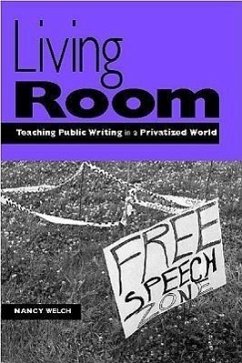How can our students findor makespaces where their ideas and arguments can be heard? Living Room takes up this question in an age defined not only by YouTube and My Space but also the conversion of public streets to festival marketplaces, the creation of cordoned-off and tucked-away free speech zones, and the state sanctioning of ethnic profiling. In Living Room Nancy Welch traces the erosion of publicity rights to post-9/11 legislation and, more troublingly, to nearly thirty years of neoliberal privatization of space, institutions, and resourceseven the very idea of who has the authority to speak and argue, especially in the political and public arenas. Joining the field's reinvigorated interest in public writing and rhetorical history, Welch argues that if we're to explore with our students when, where, and how they can deliver arguments that matter, we need to look to the lessons of earlier generations. Especially in the 20th century's struggles for labor and civil rightsthe struggles that won living room rights for ordinary people in the first placewe find consequential (and sometimes unruly) arguments: workers shutting down production lines and cash registers, students disrupting segregated lunch counters, AIDS-HIV activists dying-in across a Wall Street intersection. By examining these and other vibrant models of rhetorical action in our classrooms, we can help our students better understand how to deliver effective arguments in the most restrictive of circumstances and how to most effectively shape their arguments using genre, collaboration, audience, tone, and style. Living Room vigorously critiques our privatized era of shopping malls and Clear Channel; of state-sanctioned ethnic profiling and militarized responses to public protest; of private economic interests colluding to shape public policy on everything from energy and interest rates to health care and access to the airwaves.Read Living Room and heed Nancy Welchs call for a reinvigorated rhetoric that connects your composition classroom with a contentious, lively history of writing as social action.
Bitte wählen Sie Ihr Anliegen aus.
Rechnungen
Retourenschein anfordern
Bestellstatus
Storno

